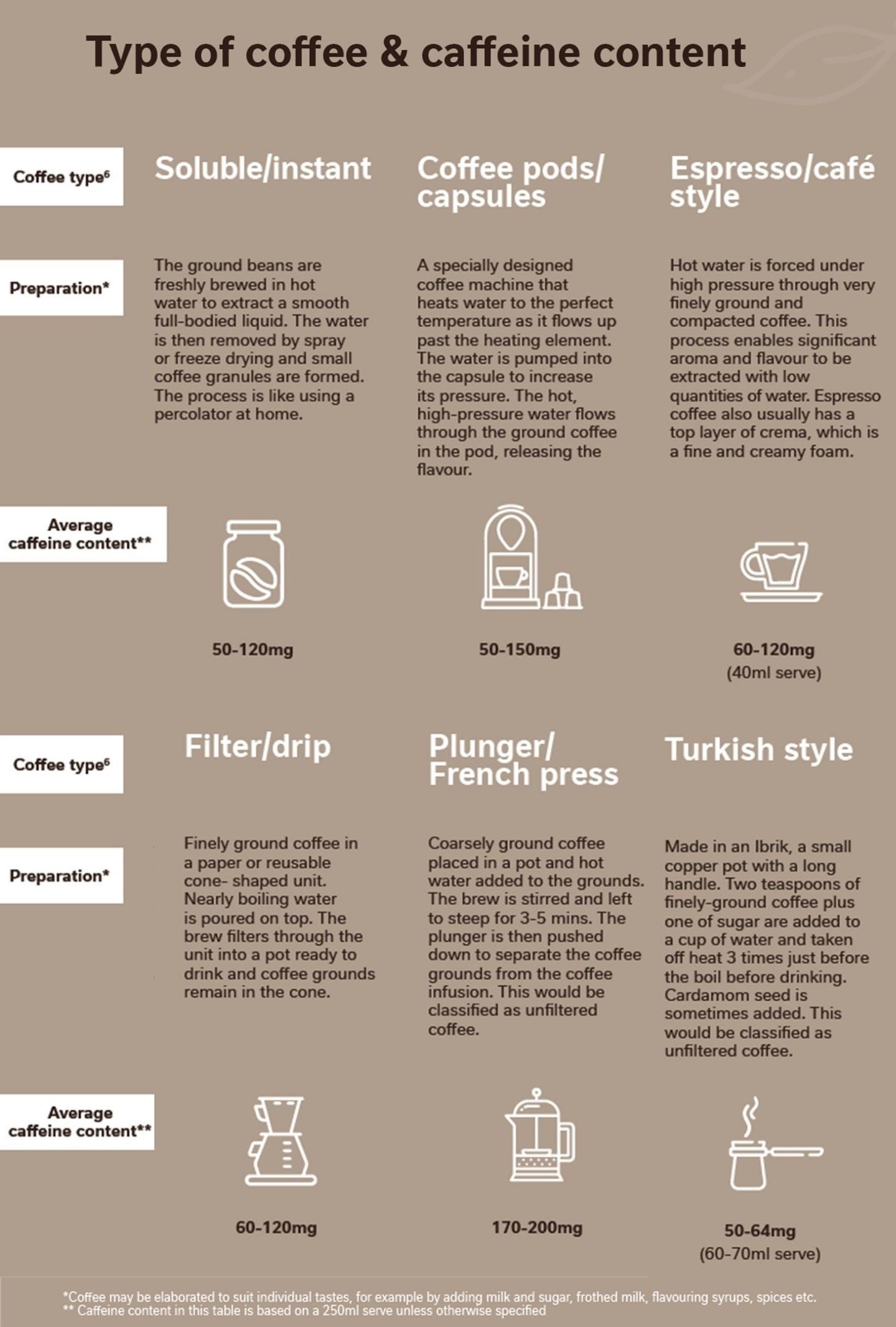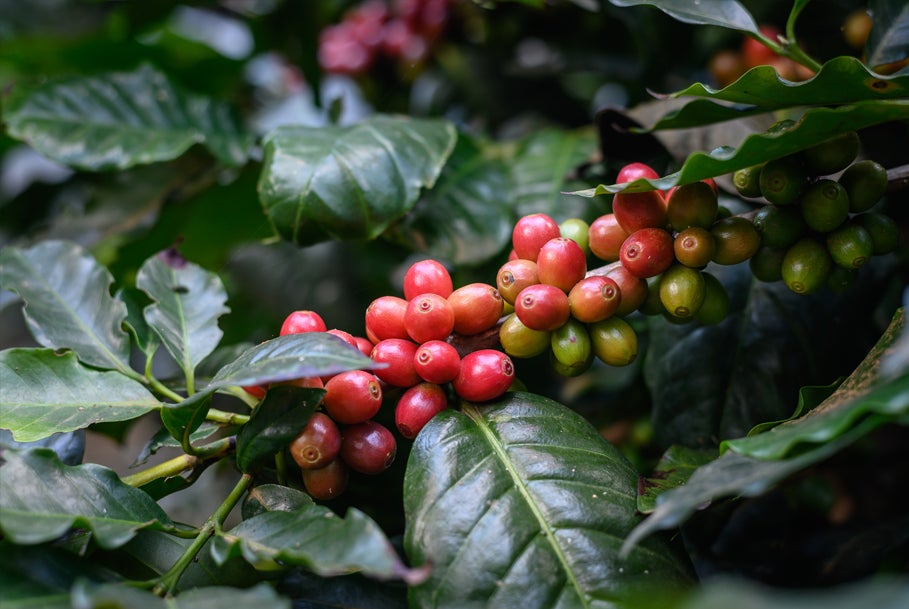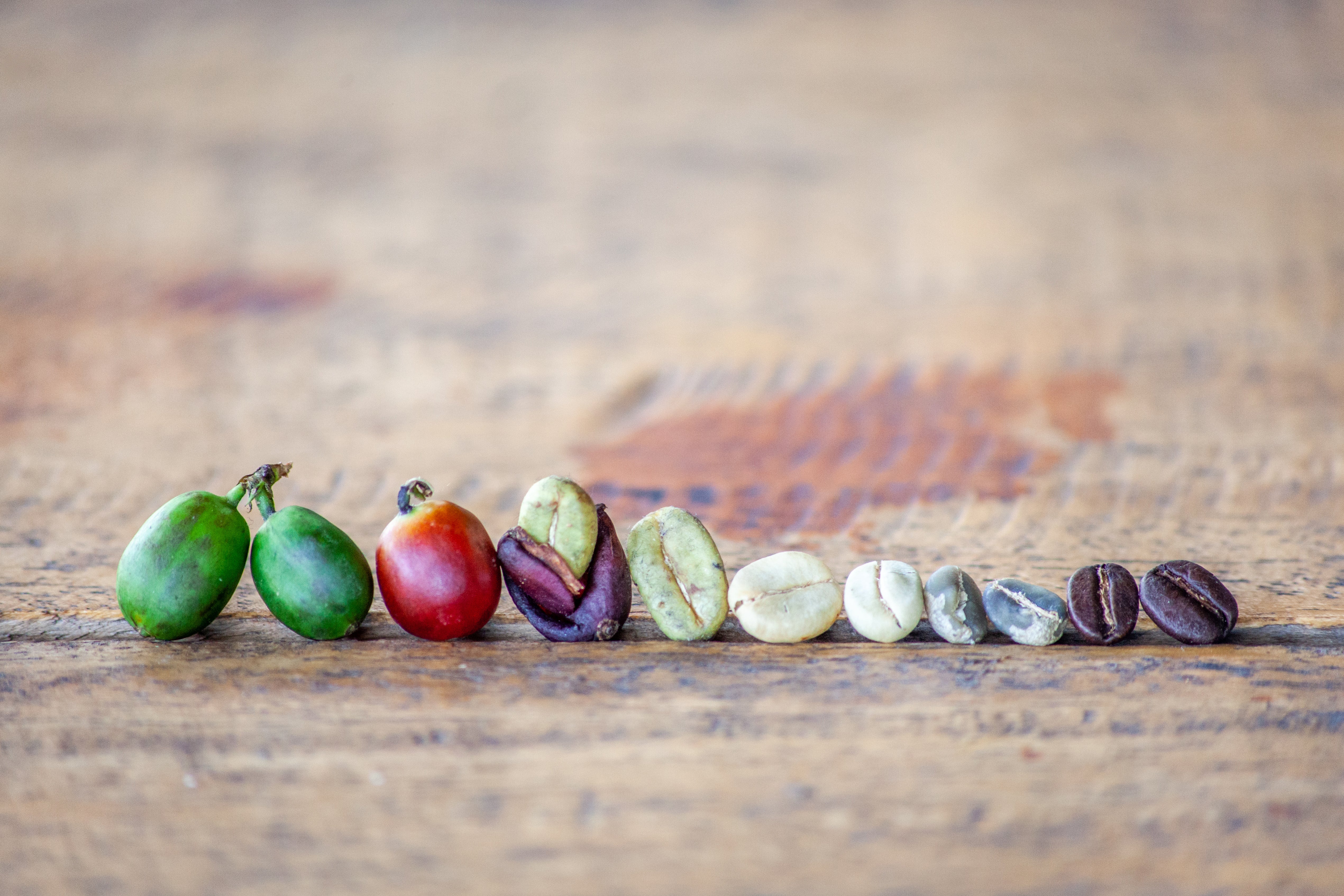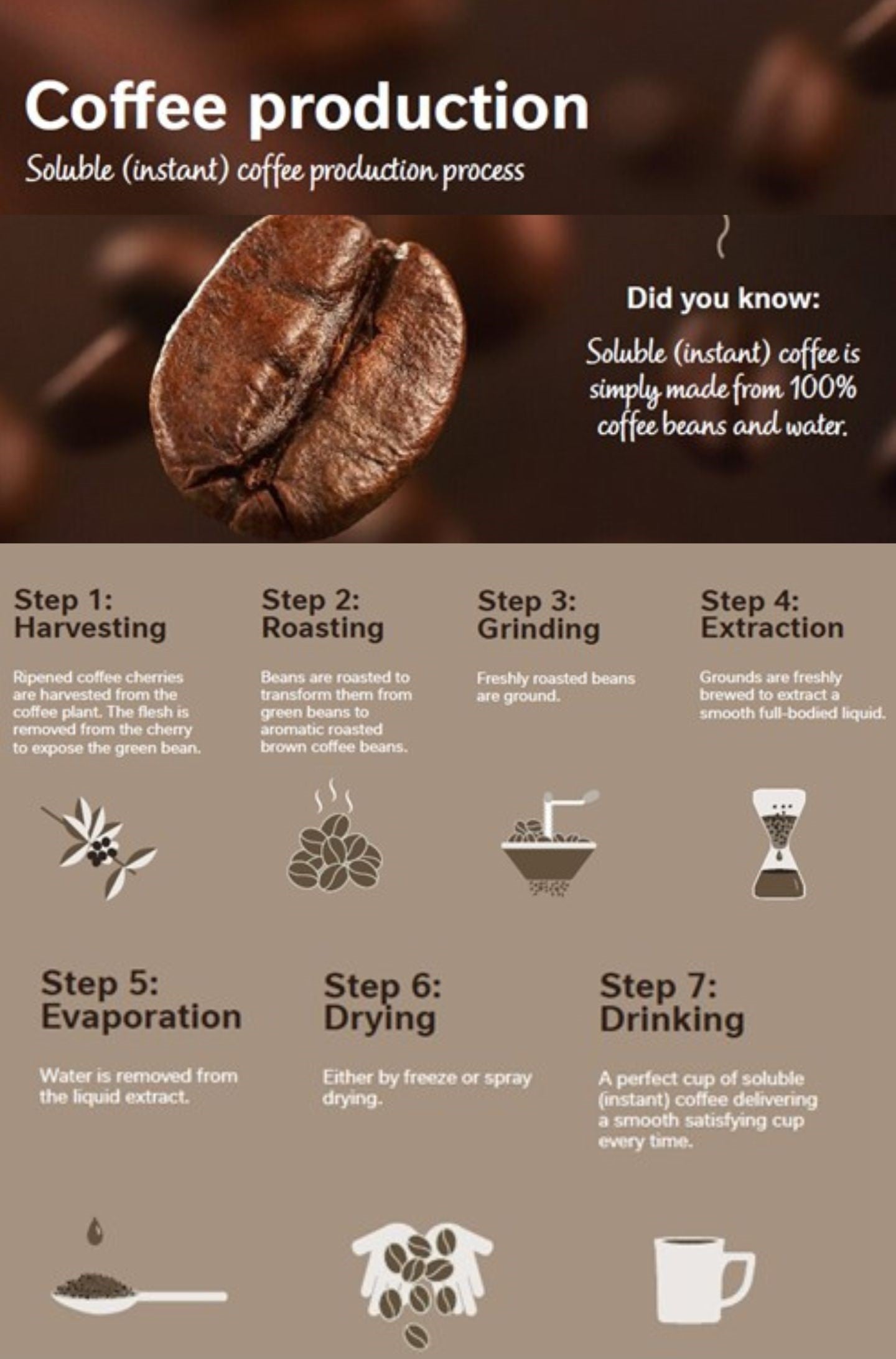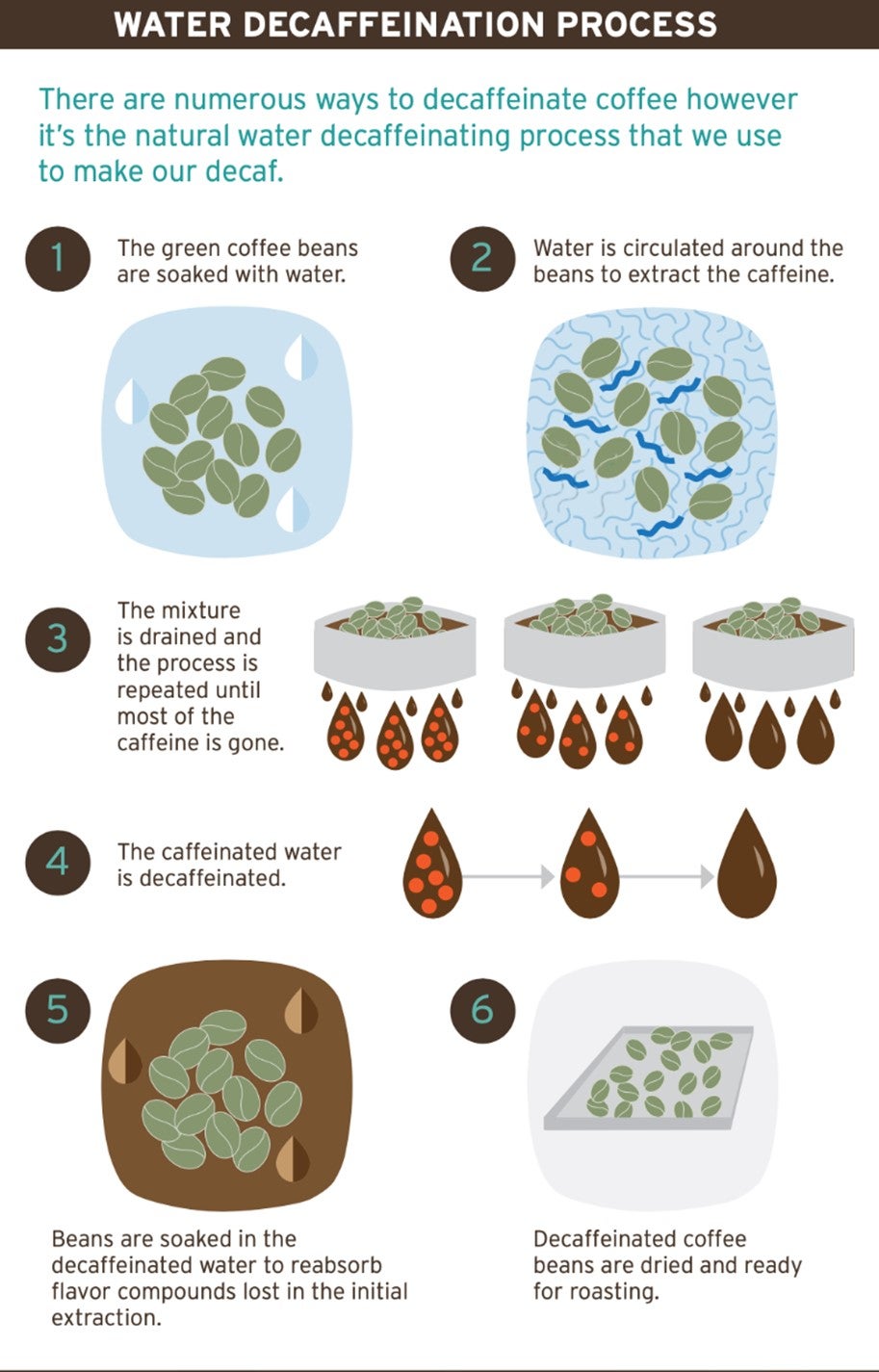
8 Coffee Myths Revealed by Expert Nutritionist
You may be surprised to learn that coffee is naturally good for you and can be enjoyed regularly as part of a healthy diet. Check out eight coffee myths revealed by our expert Nutritionist. Find out more about the natural goodness of coffee, the caffeine content of your favourite brew and exactly how many cups of coffee you can enjoy in your day!
Coffee is a popular beverage. After water, coffee is the most popular drink worldwide, with over 400 billion cups being consumed each year. Millions worldwide enjoy drinking coffee, from an early morning wake-up to a post-dinner pick-me-up.
The pleasurable experience of drinking a cup of coffee plays an essential role in many cultures. Coffee provides an opportunity to connect with friends, family and colleagues.

MYTH 1 – All coffee styles contain the same amount of caffeine
FACT – You may be surprised to learn that the caffeine content of your favourite coffee beverage varies widely from 50mg – 350mg, depending on the type of coffee you enjoy. Instant (or soluble) coffee has caffeine content similar to a café style cappuccino or latte. Certain varieties of capsule or pod coffees can be higher in caffeine, along with plunger2.
MYTH 2 – You can only drink 2 cups of coffee per day as part of a healthy diet
FACT – Great news for coffee lovers - you can enjoy 3 to 4 cups of coffee (300-400 mg caffeine) daily* as part of a healthy diet? This recommendation is based on the maximum daily caffeine intake of 400 mg3. So, if you enjoy other beverages such as tea (48 mg caffeine), cola (41 mg) or energy drinks (85 mg caffeine), this caffeine also counts towards your daily intake.
*For the general healthy population. Excludes pregnant women, children and people with specific health conditions. Consult your healthcare professional for individual dietary advice.
The table below highlights the caffeine content of popular beverages and foods.
Your daily caffeine intake can come from various foods and beverages, including coffee, tea, cola soft drinks, energy drinks and chocolate.
See below examples of 400mg of caffeine from various caffeine sources daily.
MYTH 3 - Drinking coffee does not contribute to your daily fluid intake
FACT - Drinking coffee, whether a long black, cappuccino or oat latte, all contribute to your daily fluid intake and support hydration in the body.
Staying hydrated is essential for our health and wellbeing. Australian Dietary Guidelines recommend that adults get 8-10 cups of fluid daily. The good news is this includes all fluids, such as water, milk, coffee, tea and fruit juice.
Research shows caffeine-containing beverages such as coffee, when enjoyed regularly and in moderation as part of a well-balanced diet, do not lead to excess fluid loss and won't compromise hydration4,5.
MYTH 4 – Coffee is highly processed
FACT – Coffee is made from 100% natural coffee beans harvested from the ripe cherries on coffee trees. From the coffee tree to your cup, the production of coffee is a very simple process. The only processing aid used to make coffee is water.
Harvesting: It begins with a coffee tree. Those aromatic dark brown beans we know and love start their life on a coffee tree. The coffee tree is a tropical evergreen plant, with the two most commercially important coffee bean species being Robusta and Arabica. Jasmine-scented white flowers grow along the tree's stems, and the 'beans' are the seeds of these cherries.
Soaking or sun-drying: After harvesting, the outer layers of the beans are removed to create a stable, dry green coffee bean. This is done by soaking them in water or laying them out to dry in the sun. Each coffee cherry contains two green beans.
Roasting: The beans are carefully selected and then graded/sorted. The green beans are then ready to be roasted to a dark brown colour. Roasting the beans generates hundreds of aromas and flavours, providing coffee with a distinctive taste and smell.
Ground & Brewed: The roasted coffee beans are ground, brewed and enjoyed one cup at a time. The coffee beans are made into a cup of coffee (freshly ground beans at your local café), coffee pod at home (e.g. NESPRESSO), or instant coffee (NESCAFE).
MYTH 5 – Coffee only contains caffeine and no other nutrients
FACT – Coffee is more than just caffeine! Roasted coffee beans contain the goodness of over 1,000 natural plant bioactive compounds and nutrients. The natural components of coffee beans include polyphenols, antioxidants, flavour and aromatic compounds, vitamins, minerals, lipids, dietary fibre and caffeine. Research shows the benefits of regular coffee intake may be related to the unique and natural bioactive compounds in coffee beans2.
MYTH 6 – Coffee is high in kilojoules (calories)
FACT – Coffee prepared on water is actually a low kilojoule beverage. A plain black coffee contains only five calories (10 kJ) per cup. Add the goodness of your favourite milk to coffee to boost your calcium intake (choose dairy or plant-based milk fortified with calcium).
The uplift you feel when you enjoy a coffee is linked to the caffeine content. Coffee naturally contains caffeine to help increase mental alertness, focus and concentration as part of a healthy, varied diet.
MYTH 7 – Decaf coffee contains zero caffeine
FACT – Decaffeination removes nearly all of the caffeine from coffee beans before they are roasted. A decaffeinated coffee must contain less than 3mg caffeine per kg of coffee or no more than 5mg caffeine per cup. So this means there is a minimal amount of caffeine in decaf coffee.
How is NESCAFE Decaf Coffee made?
There are numerous ways to decaffeinate coffee, however, it's the natural water decaffeinating process that we use to make our decaf.
MYTH 8 – Coffee should be avoided during pregnancy
FACT - Coffee does not have to be avoided during pregnancy, but caffeine intake should be limited. Guidelines recommend no more than 200mg/day of caffeine during pregnancy3.
Excess caffeine consumption may cause harmful effects during pregnancy. Best practice guidelines recommend pregnant women consume less than 200mg of caffeine per day (up to 2 cups of coffee per day if no other caffeine is consumed).
There is caffeine in other beverages like green and black tea and cola drinks, so this needs to be considered in the overall diet.
Decaffeinated coffee can be a useful alternative for those who like the taste of coffee but don't want to exceed the recommended caffeine intake.
Check out our extensive range of coffee solutions, including NESCAFE BLEND 43, NESCAFE GOLD, STARBUCKS AT HOME, BUONDI, THE ROASTER GUY, INTERNATIONAL ROAST, and beverage solutions automatic coffee machines.
References:
1. Nestlé (2022 and 2019). Coffee Consumption. Consumer insights research commissioned by Nestlé with Fiftyfive5.
2. Nestlé (2023). Coffee & Health: A comprehensive summary of the science for healthcare professionals. Research commissioned by Nestlé, conducted by Nutrition Research Australia (NRAUS).
3. Food Standards Australia New Zealand (2021, August). Caffeine. https://www.foodstandards.gov.au/consumer/generalissues/pages/caffeine…;
4. Silva A. M. et al. (2013) Total body water and its compartments are not affected by ingesting a moderate dose of caffeine in healthy young adult males. Applied Physiology Nutrition & Metabolism, 38:626-632.
5. Killer S. C. et al. (2014) No Evidence of Dehydration with Moderate Daily Coffee Intake: A Counterbalanced Cross-Over Study in a Free-Living Population. PLoS ONE, 9(1): e84154
